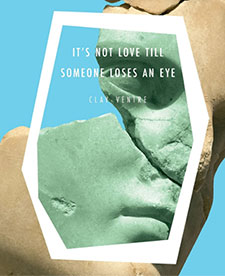 *
*
Review by Dennis Daly
First books of poetry rarely surprise. Clay Ventre’s initial collection, It’s Not Love Until Someone Loses An Eye, does. His first-rate love poems are off-beat and oddly self-demolishing. He chisels each quirky narrative to innovative perfection and then keeps on chiseling. The new, miniature worlds created by Ventre’s persona and his persona’s lover highlight reality’s instability and logical absurdness. But that’s alright. Creators (read poets), after all, are (for good or ill) gods and goddesses by virtue of their productions, and they make sense by rearranging the raw material of chaos.
Across a crowded room” love’s magic defeats distance and verbal communication in Ventre’s piece entitled Soiree. A broken semaphore of compelling motion causes contact between two lovers and opens an ever-expanding, uncanny zone of passion and ardor. Ventre concludes the poem by describing this newfound lover’s haven,

It’s Not Love Till Someone Loses an Eye By Clay Ventre Nixes Mate www.nixesmate.pub ISBN: 978-1-949279-47-4 50 Pages $18.00
the party was over
the guests having shrugged
themselves to indifference
and disappeared in a
haze of ennui and
disappointed sex
leaving them a vast
and empty space
they could finally wander
across as lonely nomads
and find each other—
read her book together
and agree that the weather
inside them was the same
The battle of the sexes starts small with afterthoughts and little motions that signal cataclysmic changes. Ventre’s poem Infinity War is well titled, with surprises at every turn. Here the protagonist god, albeit newly created himself, sets a pose of dominance by announcing the superiority of his divine passions. His consort pushes back as she fashions their future together. The poet puts it thusly,
She said
It’s not a competition
and he saw now that
she had been carving
out of some
as yet undiscovered stuff
a miniature world
for them to inhabit someday
—It kind of is
He shook from his
Closing throat
When dreams and reality clash, addition results, a detritus, not deliberate, but needing to be dealt with in a concerted way. In Ventre’s poem The Impossibility of Some Situations the lover’s expectations of his beloved’s largesse grows exponentially to the tune of twelve small elephants. His lover arrives in some distress, and she denies culpability. Loneliness and longing take over and the protagonist puzzles over his next move. Here he explains his conundrum and cedes his own future over to his fantasized beasts,
when I woke up from the dream
they were all here and
now they won’t leave me
They can’t stay here
She said
I know
He said
But they won’t leave
Well
She said
It’s them or me
He looked down at the smallest elephant he had taken
to be their leader and waited for a sign
It came in the form of a wink
timed
to the sound of a closing door
Love’s danger often slips into softened tokens and pleasure’s intensity, both underestimated and overlooked. Ventre’s title poem It’s Not Love Till Someone Loses An Eye reminds all mere mortals of their frailty in the face of God-given fervor. Right from the get-go mankind serves love’s desire under full threat. The poet opens his poem by powering up his persona’s beloved,
I should warn you
She said
Two of my former lovers
were dragged to their
deaths by wild horses
Sometimes a breakfast joint fills the whole world with satiety and delight. But when one tries to reduce it into component parts it somehow loses its luster. In his poem Breakfast All Day, Ventre’s protagonist converses with God (the Almighty One) on the virtues of his favorite diner. God pushes back in the way that God always does. An omelet, the music, and the rain become foils in this delicate argument. The protagonist’s beloved becomes the salve. Here God tones down (somewhat unfairly) the man’s satisfaction and hyperbole,
That diner
God said
Is just a cemetery with a pond
in the middle to drown in
they fish the bodies out and bury them
in the surrounding hills
I know
He said
Also
Continued God
To get here
You climbed into a car
Full of men with scarred faces
I know
He said
But the omelet was perfect
Courting demands putting one’s best foot forward or at least a recognizable and familiar foot, soothing to the judgmental beloved. Of a Feather, Ventre’s poem of fervid accommodation or, perhaps, rapt identification, succeeds wildly in devolving all oppressive expectations and conjuring up a down-to-earth lover’s tryst. The poet opens his contemplation of same-feathered birds this way,
Don’t come near me
She said from the
other side of the door
I smell like a dumpster
I have no joy in me
And I’m tired
so he walked for 1000 miles
and presented his sad
dusty shoes to her …
Love’s logic demolishes all competitive philosophies. That’s not to say that it promotes health or happiness. Obsessions usually don’t. In Ventre’s epilogue poem, The Godless Night Kitchen (Remodeled), the poet laments love’s process, but savors the result. Or is it the opposite,
He finds he and she add up
to each other
and in the morning he’ll wake
before her when
someone comes to him and
tells the truth of what
an unfinished symphony
they are
And that all hearts are designed
To harden and crack.
There are birds in there
That’s how they get out
The good news is that somehow most lovers, knee deep in cranberries and jackhammer dust, do survive. Mutually assured destruction still works, and artists of all stripes, as Ventre’s stunning poetry collection attests, navigate between the twin dangers of self-immolation and fame. And more to the point – creation and love
triumph.

 https://www.portersquarebooks.com/
https://www.portersquarebooks.com/













Reader Comments